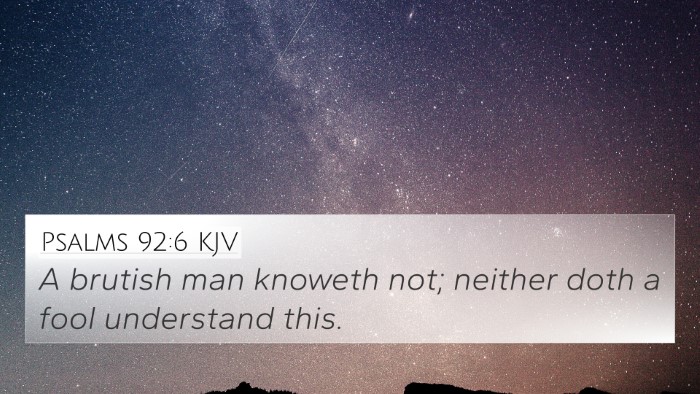Old Testament
Genesis Exodus Leviticus Numbers Deuteronomy Joshua Judges Ruth 1 Samuel 2 Samuel 1 Kings 2 Kings 1 Chronicles 2 Chronicles Ezra Nehemiah Esther Job Psalms Proverbs Ecclesiastes Song of Solomon Isaiah Jeremiah Lamentations Ezekiel Daniel Hosea Joel Amos Obadiah Jonah Micah Nahum Habakkuk Zephaniah Haggai Zechariah MalachiJob 5:2 Similar Verses
Job 5:2 Cross References
For wrath killeth the foolish man, and envy slayeth the silly one.
Uncover the Rich Themes and Topics of This Bible Verse
Listed below are the Bible themes associated with Job 5:2. We invite you to explore each theme to gain deeper insights into the Scriptures.
Job 5:2 Cross Reference Verses
This section features a detailed cross-reference designed to enrich your understanding of the Scriptures. Below, you will find carefully selected verses that echo the themes and teachings related to Job 5:2 KJV. Click on any image to explore detailed analyses of related Bible verses and uncover deeper theological insights.

Ecclesiastes 7:9 (KJV) »
Be not hasty in thy spirit to be angry: for anger resteth in the bosom of fools.
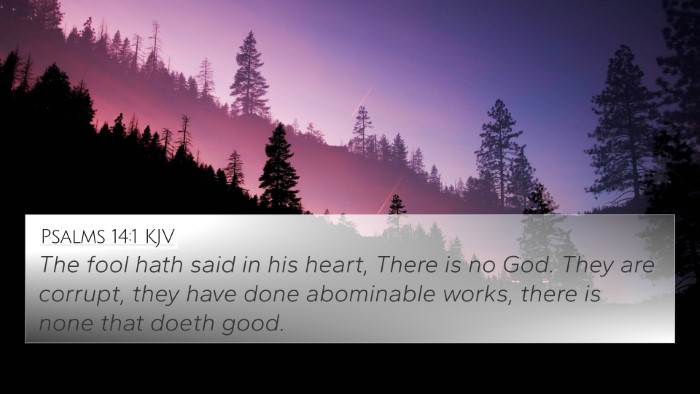
Psalms 14:1 (KJV) »
The fool hath said in his heart, There is no God. They are corrupt, they have done abominable works, there is none that doeth good.

Psalms 75:4 (KJV) »
I said unto the fools, Deal not foolishly: and to the wicked, Lift not up the horn:
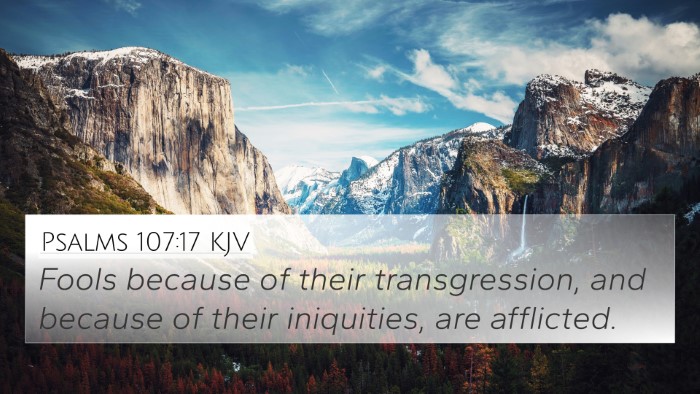
Psalms 107:17 (KJV) »
Fools because of their transgression, and because of their iniquities, are afflicted.

Job 18:4 (KJV) »
He teareth himself in his anger: shall the earth be forsaken for thee? and shall the rock be removed out of his place?
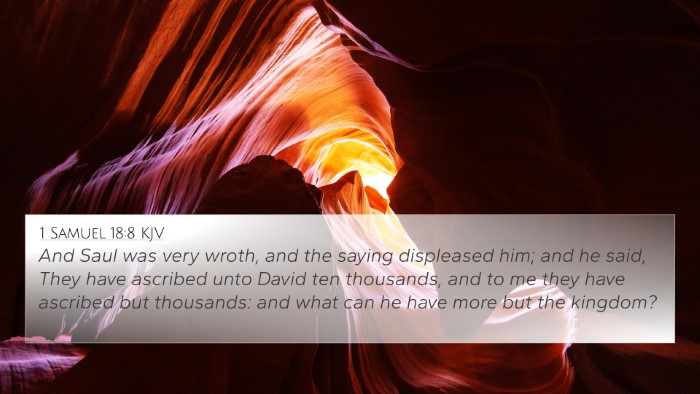
1 Samuel 18:8 (KJV) »
And Saul was very wroth, and the saying displeased him; and he said, They have ascribed unto David ten thousands, and to me they have ascribed but thousands: and what can he have more but the kingdom?
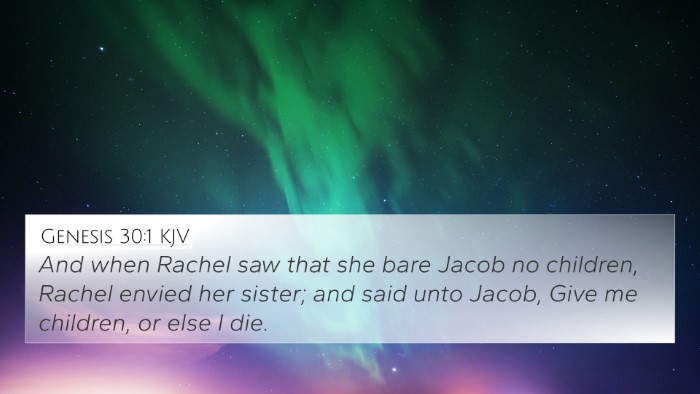
Genesis 30:1 (KJV) »
And when Rachel saw that she bare Jacob no children, Rachel envied her sister; and said unto Jacob, Give me children, or else I die.

Romans 2:8 (KJV) »
But unto them that are contentious, and do not obey the truth, but obey unrighteousness, indignation and wrath,
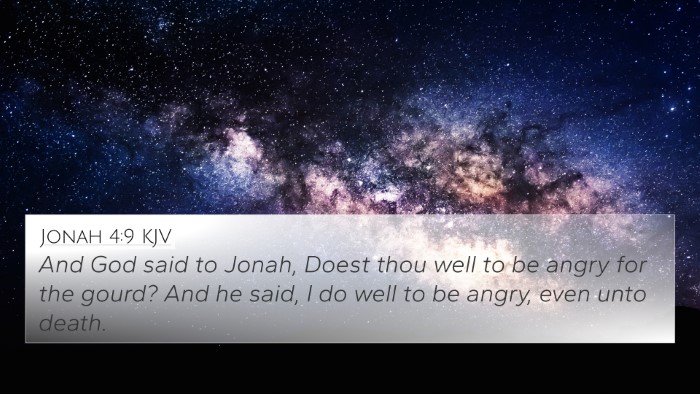
Jonah 4:9 (KJV) »
And God said to Jonah, Doest thou well to be angry for the gourd? And he said, I do well to be angry, even unto death.

Hosea 7:11 (KJV) »
Ephraim also is like a silly dove without heart: they call to Egypt, they go to Assyria.
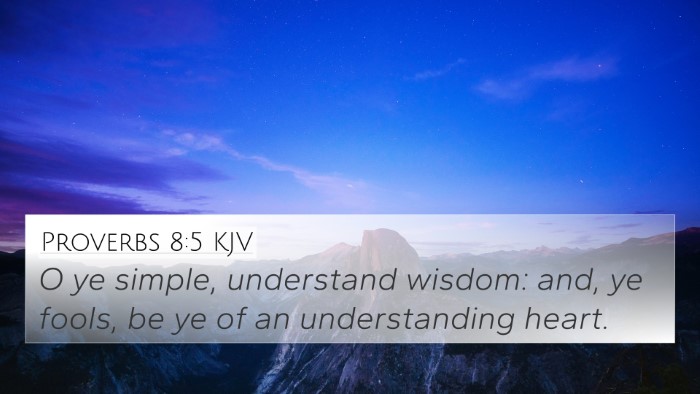
Proverbs 8:5 (KJV) »
O ye simple, understand wisdom: and, ye fools, be ye of an understanding heart.

Proverbs 1:22 (KJV) »
How long, ye simple ones, will ye love simplicity? and the scorners delight in their scorning, and fools hate knowledge?

2 Timothy 3:6 (KJV) »
For of this sort are they which creep into houses, and lead captive silly women laden with sins, led away with divers lusts,
Job 5:2 Verse Analysis and Similar Verses
Understanding Job 5:2
Job 5:2 states, "For wrath killeth the foolish man, and envy slayeth the silly one." This verse captures a critical aspect of human emotions and their consequences, both of which are reflected in many scriptures throughout the Bible.
Summary of Insights
This verse emphasizes the destructive nature of wrath and envy. It highlights how these emotions can lead to the downfall of a person. Here’s a detailed analysis based on public domain commentaries which provide invaluable insights into this scripture:
Commentary Insights
-
Matthew Henry's Commentary:
Henry expounds that wrath and envy are among the foolish man's weaknesses. He notes that unchecked anger leads to irrational behavior, culminating in one's self-destruction. Moreover, Henry emphasizes that the 'foolish man' is prone to such passions, and they are in direct opposition to wisdom.
-
Albert Barnes' Notes:
Barnes points out the inevitability of consequences that stem from wrath and envy. He interprets this verse as a warning of the dangers posed by these emotions, suggesting that they not only harm others but also the individual who harbors them. The interpretation extends to viewing them as divine retribution for human folly.
-
Adam Clarke's Commentary:
Clarke delves into the implications of emotional states, illustrating that envy can lead to profound spiritual and physical decay. He underscores the tragic irony that those who act in anger or jealousy are often the ones who suffer the most.
Bible Verse Cross-References
To deepen our understanding, here are some related scripture references that enhance the interpretation of Job 5:2:
- Proverbs 14:30: “A sound heart is the life of the flesh: but envy the rottenness of the bones.”
- James 1:20: “For the wrath of man worketh not the righteousness of God.”
- Ecclesiastes 4:4: “Again, I considered all travail, and every right work, that for this a man is envied of his neighbor. This is also vanity and vexation of spirit.”
- Galatians 5:20: “Envyings, murders, drunkenness, revellings, and such like: of the which I tell you before, as I have also told you in time past, that they which do such things shall not inherit the kingdom of God.”
- Romans 12:19: “Dearly beloved, avenge not yourselves, but rather give place unto wrath: for it is written, Vengeance is mine; I will repay, saith the Lord.”
- Proverbs 27:4: “Wrath is cruel, and anger is outrageous; but who is able to stand before envy?”
- 1 Peter 2:1: “Wherefore laying aside all malice, and all guile, and hypocrisies, and envies, and all evil speakings.”
Thematic Connections
The verse invites a comparative Bible verse analysis, looking at how various emotional states are treated across the scripture. The themes of wrath and envy recur and highlight significant moral lessons for believers:
- Emotional consequences: Many scripture passages illustrate the destruction that follows unregulated emotions, emphasizing caution against them.
- Wisdom versus folly: Job 5:2 serves as a thematic connector to numerous verses that highlight the contrast between wisdom and foolishness, drawing a clear line in the spiritual and moral behavior of individuals.
- Divine retribution: Various texts interlink, proclaiming that unchecked sinful passions will, in the end, face divine justice.
Applying the Insights
When reflecting on Job 5:2, it is crucial to recognize the emotional health of oneself and others. By cross-referencing biblical texts, one can recognize patterns that often speak of grace, redemption, and the necessity of cultivating spiritual traits that oppose anger and jealousy.
Engaging with scriptural cross-referencing tools can enhance the understanding of this verse. This study cultivates a deeper appreciation for biblical principles and encourages believers to pursue spiritual wisdom actively.
Conclusion
Job 5:2 underscores the profound impact of emotions such as wrath and envy on human life. This exploration of the verse, enriched by public domain commentaries and cross-referenced scriptures, provides a broader understanding of its implications. As believers engage in consistent Bible study, utilizing tools for Bible cross-referencing, they can draw vital insights that inform their spiritual journey.




